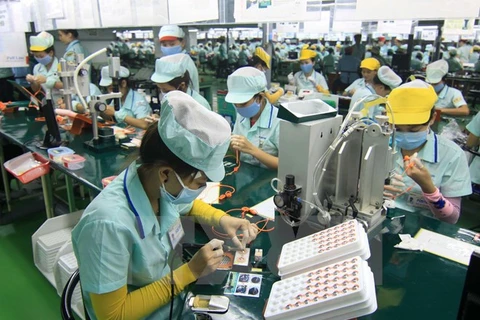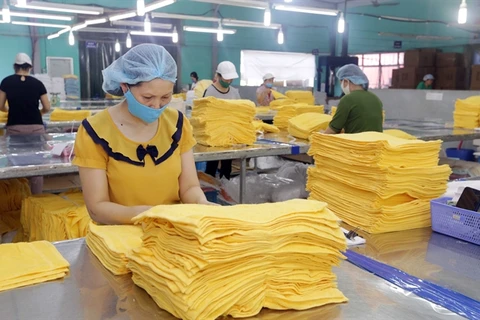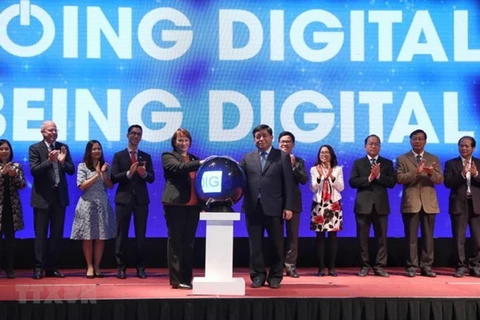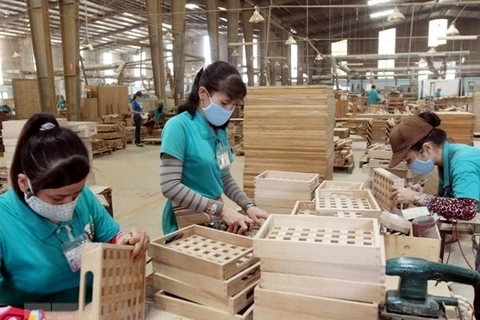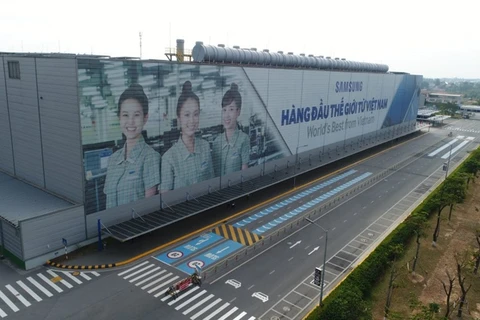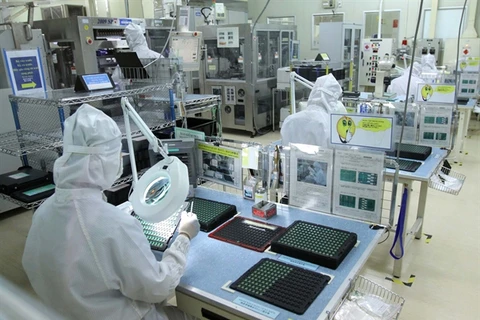 Vietnam's semiconductor industry is expected to grow strongly in the next five years - Illustrative image (Photo: VNA)
Vietnam's semiconductor industry is expected to grow strongly in the next five years - Illustrative image (Photo: VNA) Hanoi (VNA) - Despite impacts of the COVID-19 pandemic, Vietnam is still attractive in the eye of foreign investors in the electronic industry, according to Taiwan-based website Digitimes.
Digitimes reported that Vietnam's semiconductor industry is expected to grow strongly in the next five years.
Along with extensive participation in the global economic integration, Vietnam became an attractive destination for global electronic and electrical companies.
According to Fitch Solutions, amid the COVID-19 pandemic, Vietnam is still chosen by many foreign investors as a destination to build production bases, especially in the electronic industry.
Industrial parks in the northern region are now home to large-scale electronic enterprises, including Fuji Xerox, Compal, Canon, Foxconn, Petragon, Samsung, Meiko, Samsung Display, LG Display, Intel, LG Innotex , Renesas, Wintex, Panasonic, Luxshare, USI, LG Electronic, and Hosiden.
An article published on newswire entrepreneur.com said Vietnam is one of the key electronics exporters, ranking 12th place in the world.
The article noted in recent years, the country has implemented some trade agreements with other countries and flexible policies to attract foreign investors, and this would open opportunities for entrepreneurs as the industry plays an important role in Vietnam’s economy.
It added that there has been a steady increase in the nation’s exports with an average of 12 billion USD per year, hitting 96.9 billion USD in2019.
The import of electronic products has nearly doubled between 2015 and 2019. Vietnam’s electronics industry is diverse, from mobile phone, television, camera, electrical equipment, electronic integrated circuits.
The article also mentioned advantages the market offers to investors, saying the Regional Comprehensive Economic Partnership (RCEP) will help lower tariffs on trade.
In addition, Vietnam has signed a free trade agreement with the EU, which will gradually reduce most tariffs, regulatory barriers, and red tape, creating opportunities for both sides to do business.
The Vietnamese government will provide an incentive scheme implementing a 30 percent corporate income tax cut for certain business and companies working in the high-tech sector as well as in high-tech and specific industrial zones, and underdeveloped socio-economic regions.
According to the article, a new wave of the COVID-19 pandemic in Vietnam has resulted in lockdowns, restrictions and disruption to supply chains, and businesses shutdown. Despite such negative impact, plenty of foreign investors have chosen Vietnam as a top destination to set up their electronics production bases.
Vietnam's industrial parks still attract significant foreign investors, especially those operating in electronic industry.
The manufacturing and processing sector has taken the lead in attracting foreign direct investment (FDI) in the first half of 2021, pulling in 6.1 billion USD, or over 43 percent of the total.
Of the 613 foreign invested projects in 18 sectors licensed this year, electricity production and distribution ranked second in terms of FDI attraction with more than 5.4 billion USD, or over 38 percent of the total, followed by real estate with over 1 billion USD.
Notably, the LG Display Vietnam Hai Phong Co. Ltd of the Republic of Korea recently raised its investment by 750 million USD, bringing the total investment of the entire project to 3.25 billion USD.
Other big projects include a photovoltaic cell technology project - Jinko Solar PV Vietnam of Hong Kong (China) worth 498 million USD in Quang Ninh province, a tablet and laptop factory of Foxconn Singapore PTE Ltd with a total investment of 293 million USD in Bac Giang province.
In the “Vietnam Consumer Electronics Report” published recently, Fitch Solutions said Vietnam's consumer electronics market is forecast to accelerate in 2021, with the expected boost to consumer and private sector sentiment due to the global vaccine roll-out and stronger external demand for important export industries.
This industry will continue to grow through a combination of purchasing power, demographic and economic modernisation trends that gives Vietnam one of the stronger regional outlooks, with vendors set to tap into an expanding middle class and flow of first-time buyers, it noted./.
